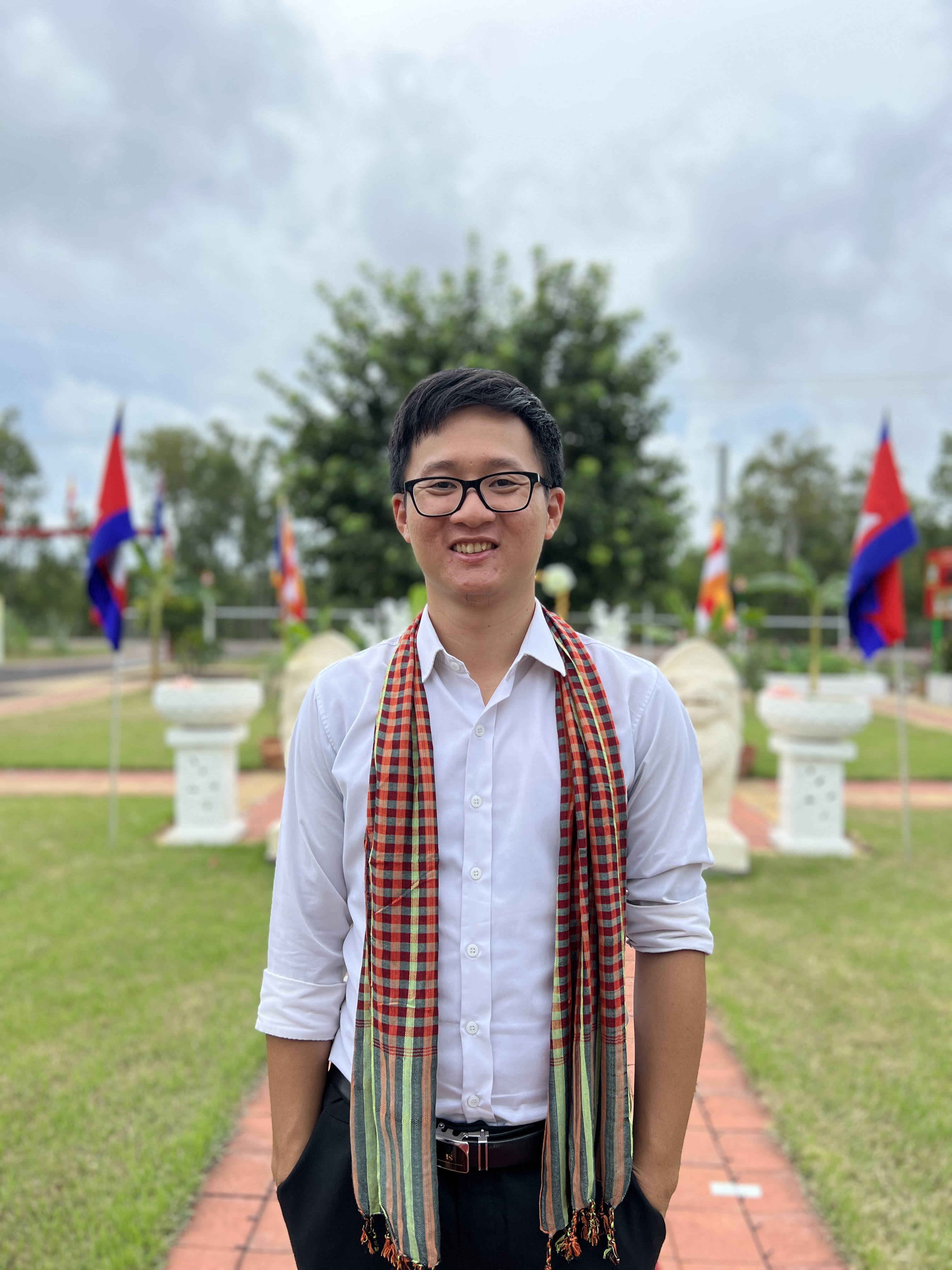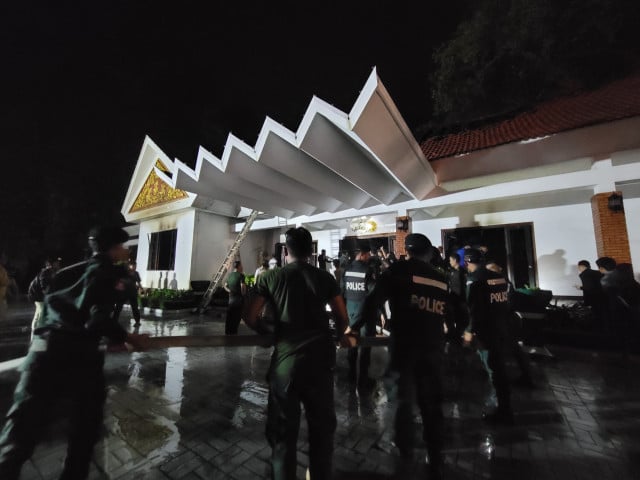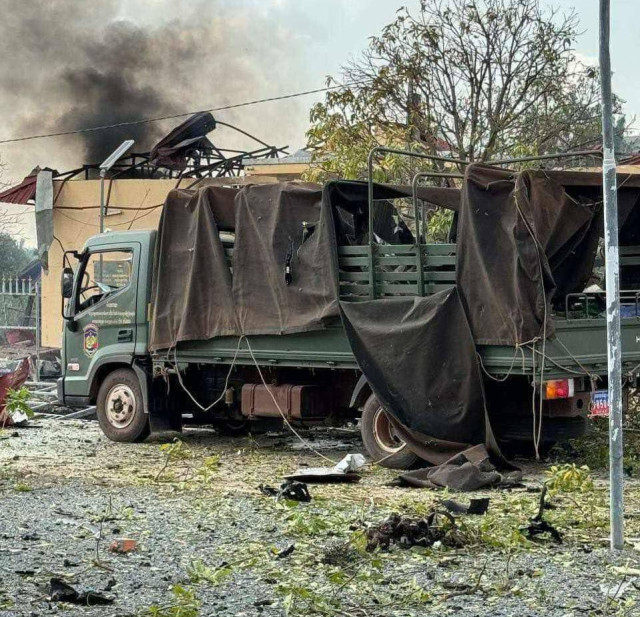A Young Cambodian Seeks to Foster Digital Culture through Australian Education Journey

- By Sao Phal Niseiy
- November 26, 2023 8:05 PM
Ky Mengly is the only Cambodian student under the Australia Awards Scholarships program to undertake a Master of Digital Learning Futures at the Charles Darwin University in Australia’s Northern Territory. As an experienced educator, Mengly believes that his Australian education will enable him to foster a digital learning environment and contribute to advancing digital culture in the education sector in his home country. During an interview, Mengly discussed his academic endeavour and his ideas to support Cambodia's path to progressive digital education.
Sao Phal Niseiy: You are undertaking a master’s degree in digital Learning Future at Charles Darwin University under the Australia Awards Scholarships. Please tell us about your course.
Ky Mengly: The Digital Learning Future (DLF) degree—a specialized stream within the Master of Education—focuses on exploring and harnessing the capabilities of digital technologies such as mobile apps, computer software, and emerging technologies. Its primary aim is to transform and reimagine education practices, encompassing both learning and teaching processes, in harmony with advancements in digital technology. Specifically, the program strives to redefine pedagogical approaches to enhance educational outcomes and foster innovative learning aligned with 21st-century skills. Additionally, DLF strongly emphasizes research and innovation, delving into the intricate relationship between digital technologies and education. Generally, students approach the degree with their background knowledge from different disciplines. I learned how digital technology influences the processes and outlook of Teaching English to Speakers of Other Languages (TESOL).
Sao Phal Niseiy: How can you develop yourself academically, intellectually, and professionally by taking this course? How necessary is such knowledge for Cambodia’s future digital education?
Ky Mengly: In pursuing academic, intellectual, and professional advancement through this course, I anticipate developing three critical dimensions of knowledge. Firstly, I aim to explore and comprehend various digital technologies, understanding their potential impact on the education sector. Secondly, as I familiarize myself with these technologies, I intend to assess their accessibility, considering factors influencing their adoption in educational institutions. Lastly, this degree will empower me to evaluate the effectiveness of adopting digital technology in education. Specifically, I aim to gain the expertise to monitor and measure whether integrating specific digital technologies in each context aligns with the targeted educational needs. This knowledge is crucially important for Cambodia, especially considering the guiding policy framework of the Pentagonal Strategy in which developing digital human resources and digital culture has become an overriding focus. There is currently still a great demand for research on the role of digital technology in education when speaking of digital culture in the education sector. There is a need for a consistent workforce to operate and maintain digital education systems and establish a monitoring unit to nurture a digital education culture and track its progress.
Sao Phal Niseiy: What are the current challenges in embracing digital education in Cambodia? How can the country deal with those challenges?
Ky Mengly: Cambodia confronts many challenges in embracing digital education. Firstly, the limited availability of digital technology infrastructure, such as reliable internet broadband, sufficient mobile data coverage, and universal electricity supply, poses a significant hurdle. Schools grapple with these infrastructure deficits, particularly in remote areas, impeding the seamless introduction of digital learning and teaching. To compensate, teachers often resort to alternative means, compromising the full integration of digital education and reverting to traditional methods. Secondly, the need for more digital human resources in the country complicates the rapid exposure of most students and teachers to the benefits of digital technology in education. Beyond introducing new tools, this challenge fosters organizational readiness for digital adoption, a time-consuming process often met with resistance.
Cambodia can adopt a dual strategy to address these challenges by investing concurrently in digital technology infrastructure and human resources, expediting and sustaining the education digitization process. Enhancing digital technology involves securing 100-percent universal electricity coverage and nationwide internet connection. Simultaneously, cultivating a pool of digital-savvy individuals begins by exposing them to technology early in their education. Maintaining this mindset is crucial, enduring potential resistance to change and avoiding distractions from the digital transformation journey.
Sao Phal Niseiy: Upon graduation, what plans do you have to use the practical knowledge and experience you acquired here to contribute to Cambodia’s digital education endeavour?
Ky Mengly: I look forward to participating in projects to cultivate a digital workforce for Cambodia's education sector. Whether engaging in research to study the dynamics of digital technology adoption or implementing specific education programs, I envision my future contributions as part of an ongoing learning and immersive journey. Through this, I aim to make meaningful and practical contributions to the continuous progress of Cambodia's education in the realm of digital technology.
Sao Phal Niseiy: You are currently the only Cambodian student under the Australia Awards Scholarships (AAS) program in the Northern Territory, where the Cambodian community is still quite small. What are the positive and negative things you have encountered living there? How do you deal with these situations?
Ky Mengly: As the only AAS Cambodian student in the Northern Territory, my experience comes with advantages and challenges. On the positive side, this region offers the beauty of nature and the richness of aboriginal culture, enabling me to immerse myself in the heritage of indigenous Australians and Torres Strait Islanders. The tranquillity of the area helps me to concentrate on my studies. However, the scorching heat, even surpassing Cambodia's weather, poses a significant challenge. Coping with extreme temperatures requires constant hydration to avoid heat-related issues. Another drawback is the limited Cambodian community here, resulting in fewer opportunities to connect with people from my home country. Additionally, the scarcity of AAS-organized events limits our chances to engage with Australian culture and build networks compared to scholars in other states.
To address these challenges, I proactively utilize school breaks to explore diverse societies. My goal is to enhance Australians' understanding of Cambodian culture and deepen my appreciation for Australian culture. Additionally, I actively seek self-improvement opportunities by working in different areas and enrolling in additional summer courses. This approach enables me to overcome the limitations of my current environment and continuously develop myself.
Sao Phal Niseiy: What final messages do you want to share with young Cambodians enthusiastic about developing digital education?
Ky Mengly: For Cambodian students aspiring to major in digital education, I advise approaching the field not merely as a platform for constant knowledge but as an arena of open-mindedness where information evolves and is influenced by various disciplines. Unlike some fields where the aim is to articulate a fixed position on a particular matter, digital learning requires an approach of endless exploration. It's about immersing yourself in a continuous journey of discovering new knowledge, justifying your rationale, and adapting your understanding context by context. The major teaches us not to answer bipolar questions but challenges us to adopt different thinking methods to approach problems. Digital education, or the digitalization of all social aspects, has transformed from a tool to a widespread culture where open-mindedness and critical analysis skills are vital for keeping pace with its developmental aspect.
















